Related Research Articles

Julia Agrippina, also referred to as Agrippina the Younger, was Roman empress from AD 49 to 54, the fourth wife and niece of emperor Claudius, and the mother of Nero.
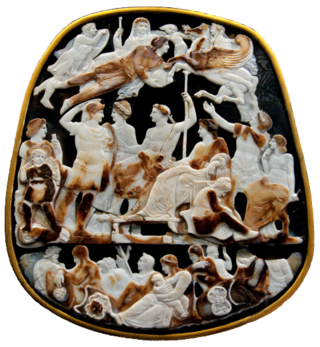
The Julio-Claudian dynasty comprised the first five Roman emperors: Augustus, Tiberius, Caligula, Claudius, and Nero.
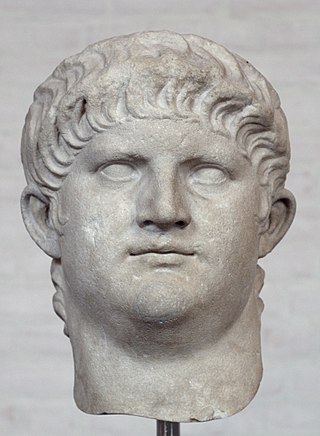
Nero Claudius Caesar Augustus Germanicus was a Roman emperor and the final emperor of the Julio-Claudian dynasty, reigning from AD 54 until his death in AD 68.
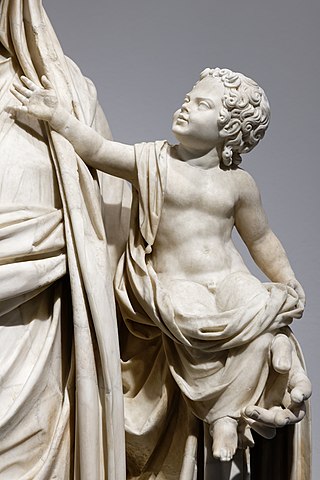
Tiberius Claudius Caesar Britannicus, usually called Britannicus, was the son of Roman Emperor Claudius and his third wife, Valeria Messalina. For a time, he was considered his father's heir, but that changed after his mother's downfall in 48, when it was revealed she had engaged in a bigamous marriage without Claudius' knowledge. The next year, his father married Agrippina the Younger, Claudius' fourth and final marriage. Their marriage was followed by the adoption of Agrippina's son, Lucius Domitius, whose name became Nero as a result. His stepbrother would later be married to Britannicus' sister Octavia and soon eclipsed him as Claudius' heir. After his father's death in October 54, Nero became emperor. The sudden death of Britannicus shortly before his fourteenth birthday is reported by all extant sources as being the result of poisoning on Nero's orders; as Claudius' biological son, he represented a threat to Nero's claim to the throne.

Poppaea Sabina, also known as Ollia, was a Roman empress as the second wife of the emperor Nero. She had also been wife to the future emperor Otho. The historians of antiquity describe her as a beautiful woman who used intrigues to become empress.
Rubellius Plautus was a Roman noble and a political rival of Emperor Nero. Through his mother Julia, he was a relative of the Julio-Claudian dynasty. He was the grandson of Drusus, and the great-grandson of Tiberius and his brother Drusus. Through his great-grandmothers Vipsania Agrippina and Antonia Minor, he was also descended from Marcus Vipsanius Agrippa and Mark Antony. He was descended from Augustus' sister Octavia Minor, herself a grand-niece of Julius Caesar.

Julia Livia, was the daughter of Drusus Julius Caesar and Livilla, and granddaughter of the Roman Emperor Tiberius. She was also a first cousin of the emperor Caligula, and niece of the emperor Claudius.

Gnaeus Domitius Ahenobarbus was a member of the imperial Julio-Claudian dynasty of Ancient Rome. Domitius was the son of Antonia Major. He married Agrippina the Younger and became the father of the emperor Nero.
Two noblemen, an uncle and nephew, who shared the name Lucius Junius Silanus Torquatus and were descendants of the Roman Emperor Augustus, lived during the 1st century AD.
Gaius Sallustius Passienus Crispus was a prominent figure in the Roman Empire during the first century. He held the consulship twice, and was stepfather of the future emperor Nero.

Claudia Octavia was a Roman empress. She was the daughter of the Emperor Claudius and Valeria Messalina. After her mother's death and father's remarriage to her cousin Agrippina the Younger, she became the stepsister of the future Emperor Nero. She also became his wife, in a marriage between the two which was arranged by Agrippina.
Paris was a slave of Domitia Lepida Minor who became wealthy enough to buy his freedom from her, adding her praenomen and cognomen to his own name to make his citizen name Lucius Domitius Paris. In return, she influenced him via Atimetus to use his favour with Nero himself to convince him of her fabrication that his influential and popular mother Agrippina was plotting to depose him.
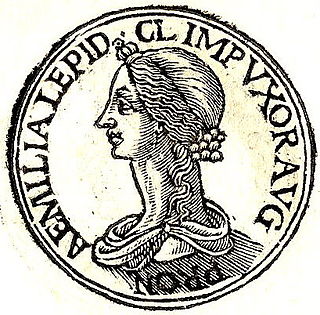
Aemilia Lepida was a noble Roman woman and matron. She was the first great-grandchild of the Emperor Augustus.
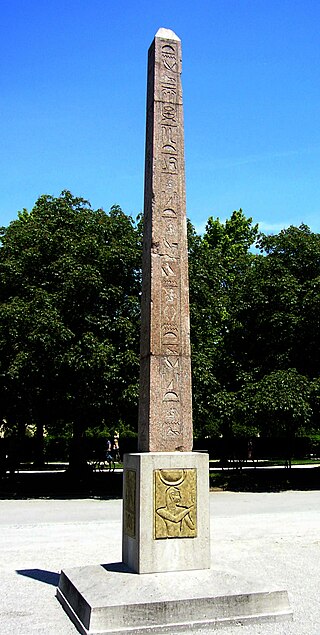
Titus Sextius Africanus was a Roman senator who was deterred by Agrippina the Younger from marrying Junia Silana. He served as a suffect consul in 59 AD. In 62 AD, he took the census in the provinces of Gaul, together with Quintus Volusius Saturninus and Marcus Trebellius Maximus. Saturninus and Africanus were rivals, and both hated Trebellius, who took advantage of their rivalry to get the better of them. Africanus is recorded attending meetings of the Fratres Arvales from 54 to 66. Titus Sextius Cornelius Africanus, who served as a consul with Trajan in 112 AD, was related to Africanus.

Gaius Silius was a Roman senator who was nominated as consul designate for 49 AD, but was executed by the emperor Claudius for his affair with the empress Valeria Messalina.
Publius Rufus Anteius was a politician of ancient Rome of the 1st century CE.
Lucius Antistius Vetus was a Roman senator who lived during the Principate. He was consul for the year 55 as the colleague of the emperor Nero.

The Stoic Opposition is the name given to a group of Stoic philosophers who actively opposed the autocratic rule of certain emperors in the 1st-century, particularly Nero and Domitian. Most prominent among them was Thrasea Paetus, an influential Roman senator executed by Nero. They were held in high regard by the later Stoics Epictetus and Marcus Aurelius. Thrasea, Rubellius Plautus and Barea Soranus were reputedly students of the famous Stoic teacher Musonius Rufus and as all three were executed by Nero they became known collectively as the Stoic martyrs.
The gens Ituria was an obscure plebeian family at ancient Rome. Almost no members of this gens are mentioned by historians, but several are known from inscriptions.
Junia Silana was a Roman patrician. She was the sister of Junia Claudilla, the first wife of Caligula, before he became emperor. Silana was a prominent figure in the power struggles that transpired in the reign of three different emperors. She was also noted for her close relationship with Julia Agrippina.
References
- 1 2 Rutledge, Steven H. (2002). Imperial Inquisitions: Prosecutors and Informants from Tiberius to Domitian. Taylor & Francis. ISBN 9781134560592 . Retrieved 2024-12-15.
- ↑ Tacitus, Annals 13.19, 21, 22
- ↑ Pagán, Victoria Emma, ed. (2023). "Atimetus". The Tacitus Encyclopedia. Wiley. ISBN 9781119743330 . Retrieved 2024-12-15.
- ↑ Rogers, Robert Samuel (1955). "Heirs and Rivals to Nero". Transactions and Proceedings of the American Philological Association . 86: 199–201. JSTOR 283618 . Retrieved 2024-12-15.
![]() This article incorporates text from a publication now in the public domain : Smith, William (1870). "Atimetus". In Smith, William (ed.). Dictionary of Greek and Roman Biography and Mythology . Vol. 1. p. 406.
This article incorporates text from a publication now in the public domain : Smith, William (1870). "Atimetus". In Smith, William (ed.). Dictionary of Greek and Roman Biography and Mythology . Vol. 1. p. 406.